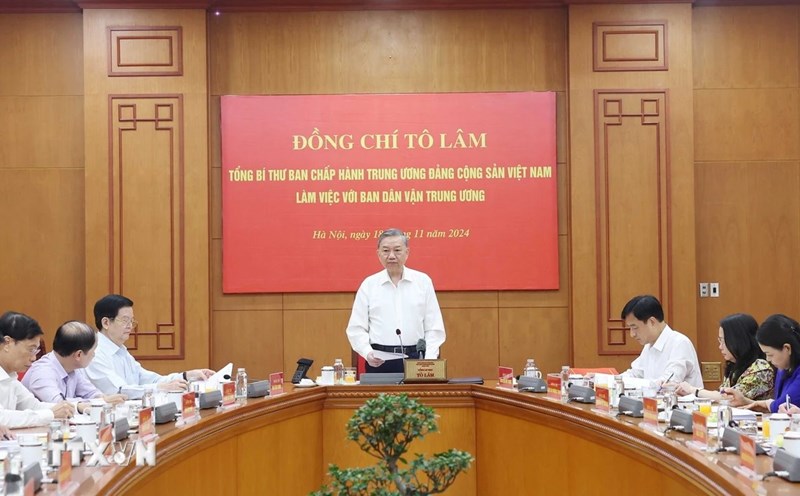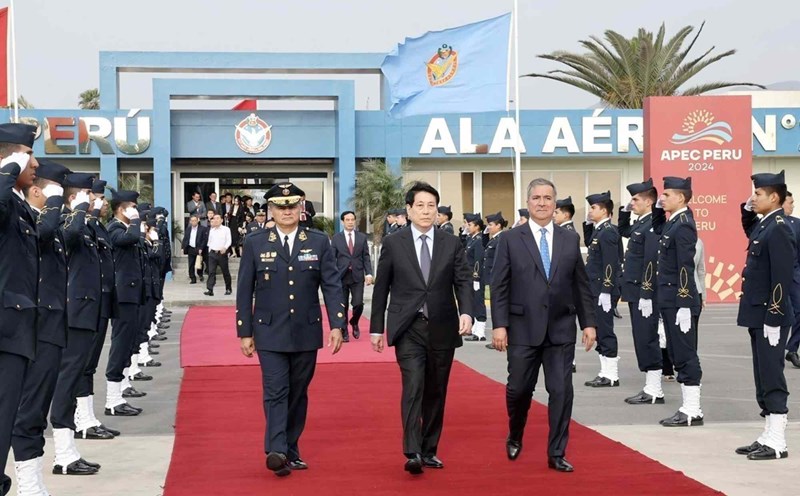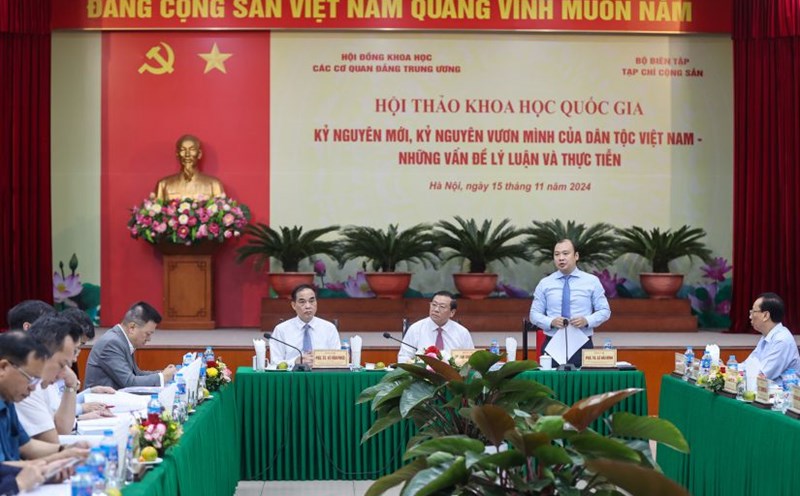The workshop “Building a modern and strong Vietnamese working class” was chaired by comrades: Prof. Dr. Nguyen Xuan Thang - Politburo member, Director of the Ho Chi Minh National Academy of Politics, Chairman of the Central Theoretical Council; Member of the Party Central Committee, Chairman of the Vietnam General Confederation of Labor Nguyen Dinh Khang and Permanent Vice Chairman of the Central Theoretical Council Ta Ngoc Tan.
The leading force in the cause of industrialization and modernization of the country
The Resolution of the 13th National Party Congress identified the requirement: "Building a modern and strong working class; improving political capacity, educational level, expertise, professional skills, industrial style, and labor discipline to adapt to the Fourth Industrial Revolution".
According to statistics, as of October 2024, the labor force aged 15 and over is 52.5 million people in all economic sectors, industries, occupations, production, business and service sectors. Workers and laborers in our country tend to be younger, with workers under 30 years old accounting for over 60%. In the process of implementing the innovation policy, the educational level of workers and laborers in our country has been constantly improved. Workers and laborers are a force capable of creativity in production and social life, quickly adapting to new mechanisms and quickly accessing advanced science and modern technology, playing an important role in determining the growth rate of the economy.
However, our country's labor force still shows some limitations. Notably, the cultural, professional and technical level is still low. Salaries and incomes of the majority of workers and laborers are generally low. Housing issues and social institutions serving workers and laborers still face many difficulties and shortcomings. Violations of regulations on wages, allowances, overtime pay, working and resting time, social insurance, health insurance, etc. are still quite serious, leading to complicated labor relations, especially in foreign-invested enterprises and private enterprises.
Continue to build a modern and strong Vietnamese working class
The issue of building the Vietnamese working class in the period of promoting industrialization and modernization of the country was stated in Resolution 20-NQ/TW dated January 28, 2008. After 15 years of implementing the Resolution, besides the successes achieved, the working class needs to make more efforts to fulfill its new role when the country enters a new era.
Some new challenges were pointed out by General Secretary To Lam in the article "Digital transformation - An important driving force for developing productive forces, perfecting production relations to bring the country into a new era", that is: "The fourth industrial revolution is taking place strongly, the development of production tools in the digital economy creates profound changes in productive forces, leading to new contradictions with existing production relations; both creating the premise and driving force for the formation of new production methods in the future, and requiring fundamental changes in the way of organizing production and social management. New productive forces are forming and developing strongly; however, the quality of human resources is still far from the requirements of national development in the new period, while training and fostering to improve the quality of human resources, especially high-tech human resources, is still a big challenge. Production relations still have many shortcomings, not keeping up with the development of productive forces".
The mission of the modern working class is not simply to apply digital technology but also to be the key factor in the process of establishing a new, advanced and modern mode of production - "digital mode of production".
To carry out this task well, the Vietnamese working class must continue to affirm and maintain the working class nature of the Party, while resolutely fighting against erroneous and distorted views about the working class nature of the Party.
In addition, there should be policies to develop the working class in the current context, which is reflected in the focus on building a social environment and liberating productive forces. It is especially necessary to pay attention to employment policies, housing policies, insurance policies, salary policies, preferential policies for selection, use and treatment, and honoring skilled workers... to create many new jobs and attract more and more workers to work.
Workers themselves also need to develop their abilities in improving their professional skills, expertise, and foreign languages, especially the ability to apply, adapt, and master new technology. They need to participate in practicing thrift and be the pioneers in fighting waste.
The Vietnam Trade Union itself must strongly innovate its organization, content and methods of operation, in the spirit of Resolution No. 02-NQ/TW, dated June 12, 2021, of the Politburo, "On innovation of the organization and operation of Vietnam Trade Unions in the new situation". In particular, the outstanding requirement is to diversify the forms of mobilization and mass gathering, to increasingly motivate and attract a large number of workers and laborers in all economic sectors to join the union and voluntarily participate in union activities... The activities of the union must be directed towards the grassroots, taking the grassroots as the area of operation, taking workers, civil servants and laborers as the objects of mobilization; taking care of and protecting the legitimate and legal rights and interests of workers, civil servants and laborers as the goal of activities. Through trade union activities, we contribute to building a constantly growing working class, fulfilling its historical mission in the new period, and entering a new era with the nation.











